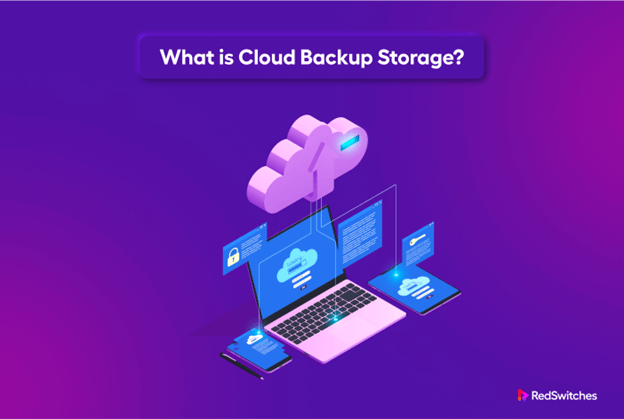There are about 3.6 billion people using cloud services worldwide. Many companies have replaced physical storage with online as it’s more reliable. You never know when an unexpected disaster will show up to destroy your storage hardware. To secure data, companies use cloud backup alongside physical storage. What is cloud backup storage?
Cloud backup storage is an online backup for storing copies of a company’s database. This storage is to preserve data in case of environmental hazards, equipment failure, or other unforeseen circumstances. Many companies implement cloud backup storage to protect their data and ensure business continuity.
When a company opts for cloud backup storage, it can protect data without increasing the workload of current IT staff. A cloud service provider prepares the cloud environment for backup and storage. They are responsible for managing clients’ data in a remote physical location.
Table of Content
- What is Cloud?
- What is Cloud Backup Storage and How Does it Work?
- How is cloud storage used for backing up data?
- How is the Data Restored?
- Three Main Types of Cloud Storage
- Types of Backup?
- Advantages and Disadvantages of Cloud Backup
- Difference between Cloud Backup vs. Cloud Storage
- Why Use Cloud Backup?
- Key Takeaways
- Frequently Asked Questions (FAQs)
What is Cloud?
The cloud refers to software and services you can access online. When you hear a statement like your data is in the cloud, it simply means it is stored on internet servers. The cloud allows you to perform various services like running applications, storing and managing data, office productivity, and other services. So instead of dealing with multiple physical devices, cloud computing gives you a seamless computing experience.
In the cloud several service providers offer cloud services to clients worldwide.
What is Cloud Backup Storage and How Does it Work?
“Cloud backup refers to transferring virtual data, applications, and services to remote servers for storage and easy retrieval in times of unforeseen data loss.” Also known as remote or online backup, cloud backup simply means backing up data in the cloud.
How is cloud storage used for backing up data?
Cloud backup works generally by copying and storing your company’s data, files, or applications on a remote server. With an unlimited storage capacity, you could choose four different options from cloud backup.
- Private Cloud Backup: In the private cloud, the remote server is run by a cloud service provider in a different location.
- On-premises Backup: It entails having a physical infrastructure for cloud backup within the premises.
- Hybrid Backup: Hybrid backup is the third type of cloud backup you could opt for. While you back up some data on-premise, you store others in the cloud.
- public cloud: In a public cloud, you share the same backup and resources with other companies in the cloud.
Whichever type you choose, the general principle is that an automatic schedule saves your data as often as you choose. When you store data, how can you retrieve it?
How is the Data Restored?

You can restore data using the application you used to upload data to the cloud. If a cloud service provider runs your backup, the restoration will occur according to their disaster recovery model.
If the data loss is enormous, you have a large volume of data for restoration. The cloud service provider can ship your data to you on a physical storage device. You can connect and restore data to your company’s servers. If the data loss is minimal, you could restore using a file-by-file basis, which is the most preferred method. This method allows you to recover individual files instead of waiting a long time for a full recovery.
Three Main Types of Cloud Storage
There are three main types of cloud storage: Object Storage, File Storage, and Block Storage. Each type stores a particular data type and cannot be used to store any other kind.
1. Object Storage
Object storage is a type of cloud storage that can store large amounts of unstructured data. It picks and identifies each piece of data as an object. . Using object storage, you can store photos, songs, videos, and files on online platforms. On the other hand, cloud object storage is metadata that allows you to track and index objects easily.
2. File Storage
File storage is the type of cloud storage that stores data in a file format and hierarchically. If you use the file type of cloud storage, you can upload, modify, or organize your files in a directory. Also, it allows for storing shared files through a network called Network Attached Storage (NAS).
3. Block Storage
Cloud block storage stores files in evenly sized blocks of data. It is the oldest form of cloud storage without metadata. Its lack of metadata makes file retrieval less productive. However, it stores data in blocks with unique addresses. You can locate the block and search out your file when you need to retrieve a file.
Types of Backup?
Backup is essential to your business; it makes it easy to regain lost data. What types of backup are available for your business? There are several types, but there are three main types; Full, Incremental, and Differential Backup.
- Full Backup: Once you initiate a backup, a complete backup copy is all you must upload, including files, applications, and data. Although it has a high level of protection, it is pretty time-consuming.
- Incremental Backups: You carry an initial full backup in an incremental backup. Afterwards, several incremental backups will follow as needed. These other backups will only save new data not saved during the last backup.
- Differential Backups: Just like incremental backup, there is an initial full backup. Every other backup uploads new data after the full backup. It solves data loss that comes with incremental backup. Data retrieval is fast.
Advantages and Disadvantages of Cloud Backup

At this point, you have seen the potential of cloud backup and what it entails. Read further to see the benefits of Cloud backup for your business.
Advantages of Cloud Backup
| Scalability | With cloud backup, your company’s growth is nothing to worry about. The cloud is highly scalable, giving you a seamless scale-up experience. Also, you can easily remove data you don’t need anymore. Unlike traditional backup techniques, you do not need to purchase physical devices during scale-up. |
| Data Security | Storing your data in the cloud protects it from environmental hazards and physical outages. The encryption that comes with cloud backup protects it from mal and ransomware. |
| Rapid Disaster Recovery | When you store your data in the cloud, it is easier, faster, and more reliable to recover data during a disaster, whether natural or man-made. Not only that, but you also get to access your backed-up data from anywhere in the world. |
Disadvantages of Cloud Backup
| Speed of Transfer | Data upload and transfer rely solely on internet connections. Imagine network connections are unstable or there is a glitch in the network during data upload. If this happens, you could lose all data without assurance of retrieval. |
| Increasing Costs | Generally, storing data on the cloud is cheaper than building and maintaining an on-site backup system. However, as the volume of data increases, the cost of cloud backup can escalate. |
| Risk of Data Breach | The main issue with storing data outside your organization is the risk of breach. To prevent this risk, you should ensure that your cloud service provider can guarantee your data’s security and protection. |
Difference between Cloud Backup vs. Cloud Storage
There are many fundamental differences between cloud backup and cloud storage based on their salient features. Some of them are in the table below for your reference.
| Features | Cloud Backup | Cloud Storage |
| Disaster Recovery | Cloud backup copies your company’s data and stores it in cloud-based storage. Disaster recovery occurs with cloud backup, as you can recover clean versions of stored files in case of loss. | Cloud storage also allows you to store data in the cloud. However, it doesn’t back it up. It only allows you to store files outside company devices to save space. Google Drive is an example of cloud storage. If cloud storage is destroyed, you may lose all data. |
| Storage Support Type | Cloud backup stores your files for recovery. | Cloud storage supplements physical hard drives. |
| Automatic Storage | Cloud backup services automatically store and sync files on your devices. | Cloud storage necessitates that you select the files for storage |
| Encryption Settings | Cloud backup offers encryption upon every data upload | You need to activate encryption in the cloud storage manually. |
Why Use Cloud Backup?

Cloud backup dramatically benefits you and your business, as seen above. It is safe to back up your data to cloud storage. With cloud backup, you have a robust data restoration plan that keeps your organization’s data safe and secure.
Key Takeaways
Cloud backup storage is suitable for your company for data restoration and recovery. As your company is among the several million cloud backup users, you should never forget these points.
- What is Cloud storage backup? Cloud backup storage is a computing service that helps transfer your data to the cloud for easy retrieval.
- While cloud backup and storage store data in the cloud, cloud backup will allow for retrieval in case of an unforeseen loss.
- Cloud backup storage has several benefits, including scalability, easy data retrieval, and accessibility.
- Cloud backup could be complete, incremental, or differential backups.
- Understanding disaster recovery helps you plan and choose the right cloud backup service providers.
With all understanding about what is cloud backup storage, all you need is a cloud service provider like Redswitches. Redswitches offers several user-friendly cloud backup options. We have different plans to suit your budget and your company. Contact us now to secure your data with cloud backup.
Frequently Asked Questions (FAQs)
Q-1) Is cloud storage good for backup?
Cloud storage is beneficial for backup. It ensures faster data recovery than physical hardware in the event of data loss.
Q-2) How do I back up to the cloud?
Your cloud service provider can integrate a backup option into your cloud package. You could opt to back up at specific periods or automatically.
Do cloud storage systems back up stored data?
Cloud storage does not back up stored data. When you have essential files in the cloud storage, you can increase security by adding cloud backup.
Q-3) Can cloud storage be destroyed?
Secure cloud storage stores your files for as long as you need them. You could choose to destroy data that is no more needed. However, cloud security threats and breaches can damage cloud storage.
Q-4) What is the size of cloud storage?
The capacity of cloud storage could be as large as 1Exabyte. The size would depend on the cloud service provider. Google, for example, offers a minimum of 15Gb cloud storage per user.

